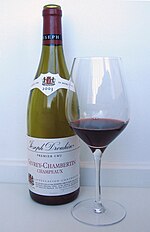Beaune (French pronunciation: [bon] (listen)) is the wine capital of Burgundy in the Côte d'Or department in eastern France. It is located between Lyon and Dijon. Beaune is one of the key wine centers in France, and the center of Burgundy wine production and business. The annual wine auction of the Hospices de Beaune is the primary wine auction in France.
The town is surrounded by some of the world's most famous wine villages, while the facilities and cellars of many producers, large and small, are situated in the historic center of Beaune itself, as they have been since Roman times. With a rich historical and architectural heritage, Beaune is considered the "Capital of Burgundy wines". It is an ancient and historic town on a plain by the hills of the Côte d'Or, with features remaining from the pre-Roman and Roman eras, through the medieval and renaissance periods.
Beaune is a walled city, with about half of the battlements, ramparts, and the moat, having survived in good condition. The central "old town" or "vieille ville" is extensive. Historically Beaune is intimately connected with the Dukes of Burgundy.
The 15th-century Hospices de Beaune, in the town center, is one of the best preserved renaissance buildings in Europe. Other landmarks in Beaune include the old market (les Halles), the Beffroi (clock tower), and the collegiate church of Notre Dame. Beaune is the main center for the "Burgundian tile" polychrome renaissance roofing style of the region. Because of its historical importance in wine production and the unique system of terroir in the region, the town of Beune was inscribed on the UNESCO World Heritage List in 2015 as part of the Climats, terroirs of Burgundy site.









